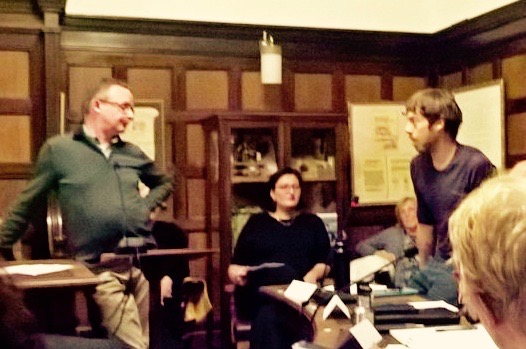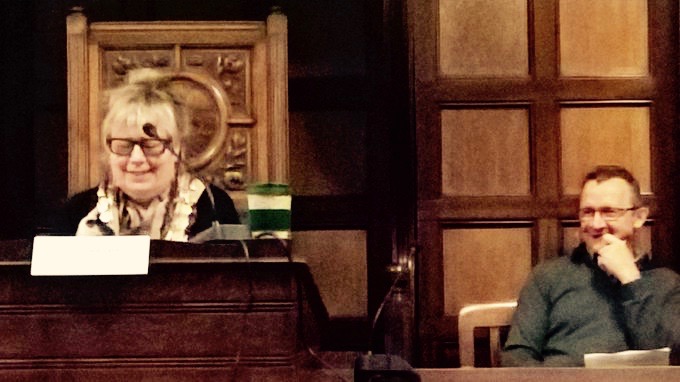Members of the public crowded into Hebden Royd Town Council chamber on September 25th, to hear Dr Nigel Taylor address widespread public concerns about patient safety and restricted access to appointments with Hebden Bridge Group practice doctors.
He was there at the invitation of Hebden Royd Town Council, which had asked the Practice to explain what was going on.
The meeting followed at least two years of public anxiety about lack of access to adequate health care, after the Practice decided to send all patients needing urgent appointments to a morning walk-in clinic in Mytholmroyd.
Dr Taylor said that the Practice is “desperate to recruit more GPs” and has been advertising continuously since five of the 12 GPs left in 2018 for personal reasons. It now only has 9.25 Full Time Equivalent GPs and GP equivalents (Advanced Practice Nurses and Pharmacy Practitioners), for 18,000 patients.
In response to Councillors’ questions, Dr Taylor told the meeting that the Practice would reconsider the possibility of holding the walk in clinic in Hebden Bridge as well as Mytholmroyd, on alternate fixed days.
They will also think about what to do about patients queuing outside the walk in clinic, but the problem with opening the building before 8am is that it would need staffing.

He added that, for patients who are physically unfit to attend the walk-in, or can’t get there between 8am-10am,
“When something comes in that doesn’t fit in the box, we try and accommodate it.”
The Mayor, Cllr Carol Stowe, said the Town Council had heard from many members of the public about problems with the Practice.

As well as problems with the walk-in clinic, issues include:
- appointments cancelled at the last minute and then another 4 or even 6 week wait,
- automatic prescription of painkillers rather than discussing a patient’s request for physiotherapy,
- repeat prescriptions being incorrectly issued,
- admin errors with medical consequences – eg carrying out the wrong blood tests and scan referrals not sent, and
- having to disclose health problems to the receptionist.
Dr Nigel Taylor told the meeting that in line with government plans, the Practice had trained receptionists as “Care Navigators”. They are now responsible for identifying patients’ needs and where they should go for consultation.
Upper Calder Valley Plain Speaker finds it hard to see how this is going to help, when Dr Taylor said the Practice had tried non-clinical triage before and it didn’t work – which was why they set up the walk-in clinic instead.
Dr Nigel Taylor told the meeting that part of the reason for the increased ‘demand’ for GP appointments, that the Practice is unable to meet, is that GPs are already delivering services previously provided in hospital.
What is going to happen if and when the Calderdale and Huddersfield hospitals cuts and centralisation plan goes ahead and the new Primary Care Networks have to deliver even more hospital services?
After the meeting, Rosemary Hedges, a member of the Patient Representation Group, said,
“Dr Nigel Taylor gave Councillors the bare bones of the practice arrangements and current issues with funding shortfalls and staff shortages.
“But his answers to Councillors’ questions didn’t fully address people’s concerns. They also raised a number of other questions, that the public now needs answers to.”

The difficulty in obtaining appointments has been present for a long time, way before the loss of GPS in 2018 Dr Taylor refers to. Using this as a ‘Reason” is disingenuous. We deserve better!
Jill
Agreed on all points.
Nigel Taylor has told the Council and members of the public very little that they didn’t already know except possiblythe Whole Time Equivalent staffing numbers. Even then he has not differentiated between GPs and other professionals but if the latter are seeing patients instead of GPs seeing them then on these figures they should be able to operate a more extensive appointments system instead of the morning cattle market. The ratio of GPs to patients used to be 1 GP per 2500 registered patients and on these figures the practice is not as short of staff to consult as it claims to be. Also they used to have 20000 patients- 2000 patients must have gone elsewhere, 10% of their total. I wonder why.
All that having been said, and although I am no defender of the practice that doesn’t even want to hear the general public’s questions, unless Tony Martin explained what follows in his presentation, a key to understanding what is driving the practice is government policy on primary care development. The fact is that the government intends a reduction in GP referrals to to hospital, and a drastic reduction in unplanned admissions, by forcing GPs to see only those patients with complex health needs, with the majority of patients being seen most of the time by other health professionals. This is not local to Calderdale but is national policy, and GPs have to comply.
Further primary care is being reorganised into health and social care neighbourhoods where practices work together with social services to serve a local population. In the Upper Calder Valley this includes practices in Todmorden. The only consolation here is that over time the impact of uncaring attitudes in HBGP ( and most of us have been on the receiving end of some of them as well as also receiving professional care ) will be diluted with more reasonable attitudes.
Finally I hope terminology used is just a matter of reporting style but I note the reference to those who can’t attend the cattle market as “it”. I hope Nigel Taylor didn’t actually use this terminology. But sometimes when trying to access some sort of flexibility in practice policy it does feel that our status as patients is below that of cattle- I often think that at least cattle are offered access to drinking water but the practice keeps people waiting for 2 hours + without a water fountain.
And as for having to staff the place if they open the doors at 8, there are obviously staff there before they let patients through the door, again an example of disingenuous uncaring supercilious behaviour.
Thanks for your comment Viv, your summary of the national policy for Primary Care Networks echoes the briefing to Hebden Royd Town Council for their 12th June meeting, provided by Calderdale and Kirklees 999 Call for the NHS. Re the quote by NIgel Taylor that you mention, as you will see it is reported inside quotation marks. This is because it is exactly what Dr Nigel Taylor said.
In that case I am appalled. If a senior partner in the practice is referring to patients as inanimate objects, that explains a lot. One of the things that troubles me about a basic lack of humanity experienced through practice policies is that the staff are learning that it’s ok to treat patients like this. I witnessed an interchange some 18 months ago between a receptionist and a woman concerned about the prescribing regime for her poorly young son. She kept asking for the contact details of the Practice Manager and the receptionist just shrugged her shoulders and said” Oh he won’t be interested. We deal with all that sort of thing”. The woman left without answers to her questions and with no information on how to complain.
And that was before the mass exodus of GPs .
Thanks for comment and info Vivien. I’m not sure when HB Group Practice introduced their complaints procedure,and it may have been after the incident you witnessed. But it clearly states “Complaints should be addressed to Mr Tony Martin, Practice Business Manager. Alternatively, we can arrange an appointment with Mr Martin in order to discuss your concerns. He will explain the complaints procedure to you and will make sure that your concerns are dealt with promptly.” So let’s hope the HB Group Practice receptionists aka Care Navigators are now up to speed with this and don’t think they are the ones who have to deal with complaints. https://www.hbgp.co.uk/pages/Complaints-Procedure
This crisis in our NHS primary care cannot be unique to the Hebden Bridge Group Practice and will only increase as restrictions on access to treatments increase and A&E departments decrease. Is any body officially or otherwise, monitoring the situation and reporting possible solutions?
In Calderdale and Kirklees, the Clinical Commissioning Groups are monitoring the Primary Care Networks to see if they reduce hospital admissions so that Calderdale and Huddersfield hospital bed cuts can go ahead. They’re not allowed to cut beds until they can show it’s safe because the need for them has reduced. Clinical Commissioning Groups everywhere else I reckon will also have to monitor what goes on in Primary Care Networks – if for no other reason than that the payments to them depend on meeting specific outcomes defined in their contracts, such as cutting hospital attendance and admissions and a load of other outcomes. All monitored through data analytics supplied by companies like Optum.
Undoubtedly true but in the Upper Calder Valley the effects of HBGP are disproportionate because of the virtual monopoly of primary care which HBGP has acquired over the years. Plus you have to wonder whether every practice has “solved” the problem of providing personal care to so many people with limited resources by herding everybody into one waiting room for over two hours.